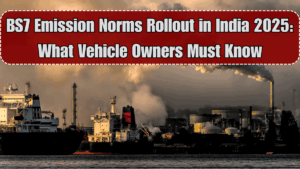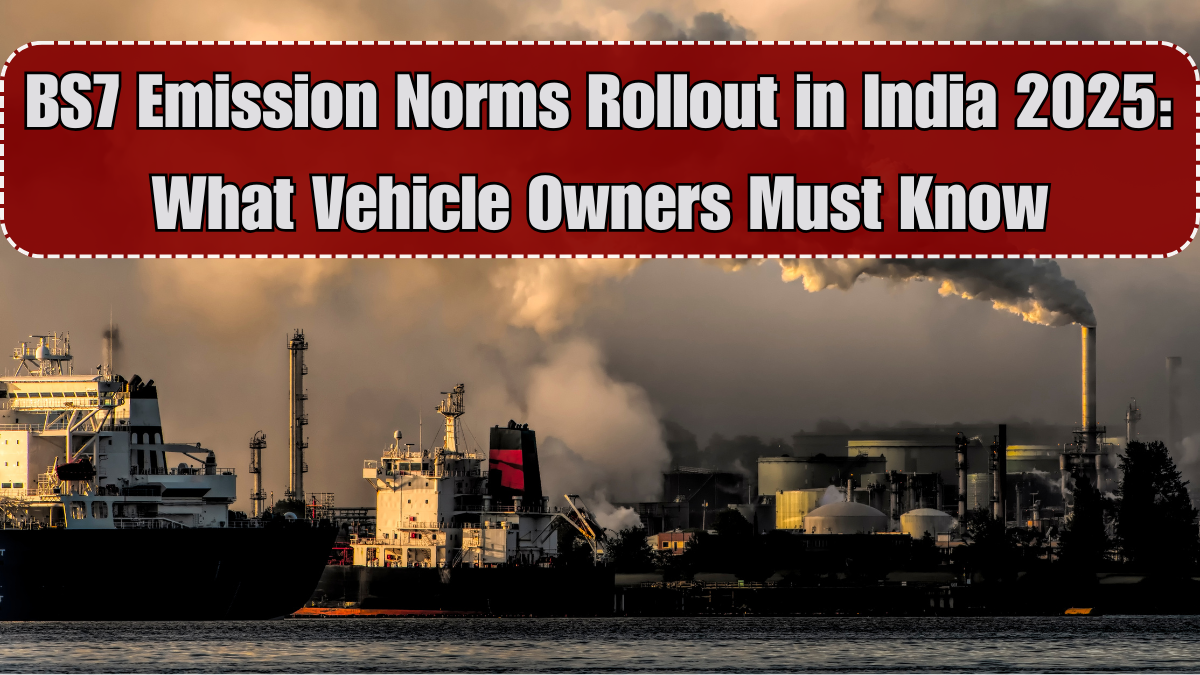In 2025, India is officially rolling out the Upcoming BS7 Rule Implementation 2025, a landmark shift in vehicle emission regulation. These updated standards are aimed at aligning Indian automobile emissions with global environmental targets while promoting cleaner fuel combustion across the country. With stricter compliance requirements and modern engine mandates, the BS7 norms are set to replace the existing BS6 regulations with immediate effect in new vehicle manufacturing and testing protocols.
The BS7 Rules India bring major changes not just for automakers, but also for everyday drivers. Whether you are buying a new petrol/diesel car or riding a two-wheeler, knowing these emission rule updates will help you stay compliant and avoid future penalties.

What’s New in BS7 Emission Norms?
The vehicle emission norms under BS7 come with enhancements in both fuel efficiency and pollution control. Here’s what’s changing in 2025:
-
Introduction of Real Driving Emission (RDE) monitoring systems
-
Improved On-Board Diagnostic (OBD) systems in all new vehicles
-
Stricter NOx and PM (Particulate Matter) emission limits
-
Mandatory usage of Ethanol-blended fuel (E20) in petrol vehicles
-
Updated standards for hybrid and electric vehicles (EVs)
This means all vehicles manufactured from September 2025 onwards must meet the BS7 Rules India before registration.
Key Differences Between BS6 and BS7 Standards
| Feature | BS6 Standard | BS7 Standard (2025) |
|---|---|---|
| NOx Emission (Petrol Cars) | 60 mg/km | 50 mg/km |
| NOx Emission (Diesel Cars) | 80 mg/km | 60 mg/km |
| PM Limit (Diesel) | 4.5 mg/km | 3.0 mg/km |
| RDE Testing | Optional | Mandatory |
| OBD Level | OBD-I | OBD-II and Real-time Alerts |
These advancements are expected to drastically reduce vehicular pollution in major metro cities and industrial corridors.
How This Affects Vehicle Owners and Buyers
If you own a BS6-compliant vehicle, there’s no need to panic. BS7 rules apply only to new vehicles manufactured post-implementation. However, future resale value and RTO transfers may eventually prefer BS7-certified models. Here’s how the upcoming BS7 rule implementation 2025 impacts you:
-
New buyers must ensure the vehicle has BS7 certification
-
Older vehicles (BS4 or below) will face registration challenges
-
Insurance companies may soon require emission certificates based on BS7 standards
-
Servicing costs for BS7 vehicles may initially be higher due to newer tech integration
This is a pivotal shift in India’s green mobility drive and positions the country closer to EU-level standards.
Automaker Readiness & Market Impact
Major automobile brands like Maruti Suzuki, Hyundai, Tata Motors, and Hero MotoCorp have already begun testing BS7 prototypes. The Indian automobile market in 2025 is seeing:
-
Slower production cycles for existing BS6 inventory clearance
-
Temporary price hikes in new models due to compliance tech
-
Early bird schemes and subsidies on BS7 electric or hybrid variants
For eco-conscious consumers and vehicle emission norms followers, now is the ideal time to make the switch.
FAQs
What is the implementation date for BS7 norms in India?
The BS7 emission standards will be applicable to all new vehicles manufactured from September 2025 onwards.
Will BS6 vehicles be banned after BS7 comes into effect?
No. BS6 vehicles will remain legal, but new vehicle registrations must meet BS7 compliance.
How does BS7 affect fuel economy?
With better engine management systems and RDE compliance, BS7 vehicles are expected to be more fuel-efficient and cleaner.
Can I still buy a BS6 car in 2025?
Yes, but only till stock lasts. After BS7 rollout, only BS7-compliant models can be registered as new vehicles.
Are BS7 vehicles more expensive?
Initially, yes—due to advanced OBD systems and tech upgrades. However, better mileage and lower pollution make it a smart long-term investment.
What is RDE testing under BS7?
Real Driving Emissions (RDE) testing ensures vehicles meet emission norms during actual road use, not just in labs.
Click here to know more.
